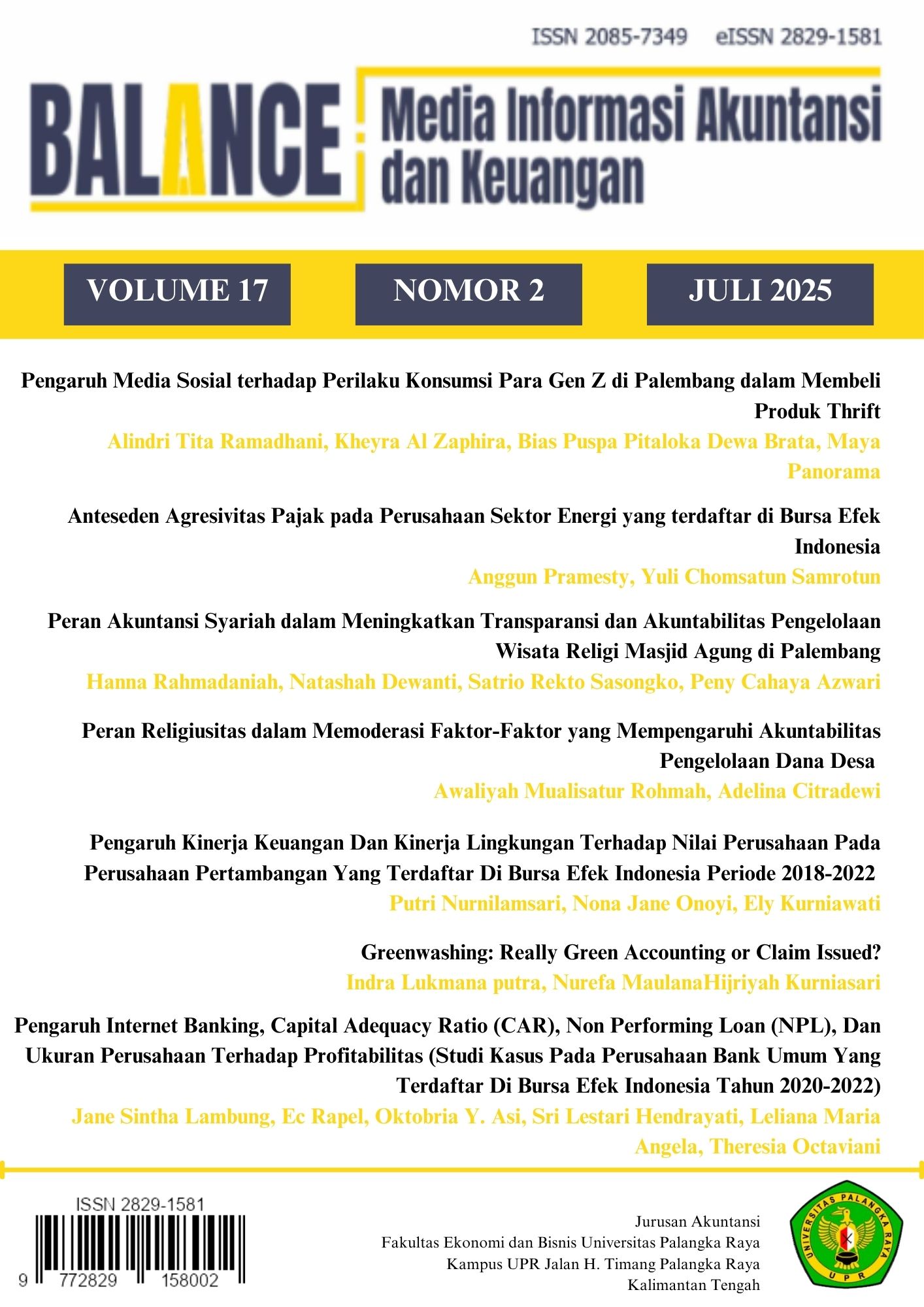Greenwashing: Really Green Accounting or Claim Issued?
DOI:
https://doi.org/10.52300/blnc.v17i2.19235Keywords:
Corporate Image Strategy; Greenwashing; Sustainability.Abstract
Greenwashing has been a major concern in discussions on sustainability, where companies often claim environmentally friendly practices that are not always backed up by concrete actions. This research aims to determine whether greenwashing truly reflects sustainability or is just a marketing tactic. The method used analyzes literature and case studies from various industries over the period 2021-2024. The research found that greenwashing is more often used as a corporate image strategy than an actual commitment to sustainability. The results show that many companies utilize uncertain and less transparent environmental claims, which ultimately misleads consumers and hinders real progress in sustainable business practices. The findings emphasize the importance of stricter regulation and clearer reporting to ensure that sustainability claims truly reflect actions that support the environment. This research lies in highlighting the prevalence of greenwashing, which can inform policymakers and regulatory bodies about the need for stricter regulations and clearer reporting standards to protect consumers and promote genuine sustainability.The research is limited by its focus on the 2021-2024 period and lacks clarity on specific industries or regions, which may affect its generalizability. It relies on secondary sources without primary data, such as interviews or surveys, potentially missing emerging trends or firsthand insights into greenwashing practices.
Keywords: Corporate Image Strategy; Greenwashing; Sustainability.
Downloads
References
Abubakar, A. S., & Zakeri, E. N. (2024). Sustainable accounting and accountability practices in
emerging economies. [Journal of International Accounting, Auditing and Taxation]. 45.
https://doi.org/https://doi.org/10.1016/j.intaccaudtax.2023.100256
Ahmed, K., & McLellan, R. (2021). Sustainability management accounting: Bridging the gap between
environmental performance and financial reporting. . Sustainability Accounting, Management
and Policy Journal, 12(4), 789-810.
Air, C. f. R. o. E. a. C. (2023). Greenwashing in the Energy Sector: A Global Review.
https://crea-research.fi/greenwashing-energy-sector-report-2023
Bickman, L., & Rog, D. J. (2008). The SAGE handbook of applied social research methods. Sage
publications. https://doi.org/https://doi.org/10.4135/9781483348858
Boote, D. N., & Beile, P. (2005). Scholars before researchers: On the centrality of the dissertation
literature review in research preparation. Educational researcher, 34(6), 3-15.
Brown, C., & Williams, P. (2023). The role of green accounting in automotive technology innovations.
Journal of Cleaner Production. 391(132643).
https://doi.org/https://doi.org/10.1016/j.jclepro.2022.132643
Burritt, R. L., & Schaltegger, S. (2019). Sustainability Accounting and Reporting: A Review of Current
Practices and Future Directions. Sustainability Accounting, Management and Policy Journal,
(4), 543-563. https://doi.org/https://doi.org/10.1108/SAMPJ-06-2018-0214
Cai, W., & Zeng, S. (2022). Blockchain Technology and Sustainability Accounting: Opportunities and
Challenges. Journal of Cleaner Production 366(132910).
https://doi.org/https://doi.org/10.1016/j.jclepro.2022.132910
Delmas, M. A., & Burbano, V. C. (2011). The drivers of greenwashing. California management review,
(1), 64-87.
Dumitru, M., Glavan, M. E., Gorgan, C., & Dumitru, V. F. (2013). International integrated reporting
framework: a case study in the software industry. Annales Universitatis Apulensis: Series
Oeconomica, 15(1), 24.
Eccles, R. G., & Krzus, M. P. (2018). The Integration of Sustainability and Financial Reporting: The
Case of Integrated Reporting. wiley.
Gjølberg, M. (2021). New Frontiers in Sustainability Accounting: Exploring the Latest Trends and
Technologies. Journal of Cleaner Production, 310(127391).
https://doi.org/https://doi.org/10.1016/j.jclepro.2021.127391
Hughes, A. S., & MacDonald, J. A. (2022). Adoption of sustainability reporting in management
accounting: The role of organizational factors. British Accounting Review, 54(3), 100093.
https://doi.org/https://doi.org/10.1016/j.bar.2021.100093
Initiative, G. R. (2021). GRI Standards: Global Reporting Initiative.
https://www.globalreporting.org/standards/ (GRI Standards)
Jacobsen, L., & Barker, R. A. (2021). The role of management accounting in corporate sustainability: A
review and future research directions. Accounting, Auditing & Accountability Journal, 34(5),
-953. https://doi.org/https://doi.org/10.1108/AAAJ-08-2020-4642
KPMG. (2021). The Time Has Come: The KPMG Survey of Sustainability Reporting 2020. KPMG
International.
Lamberton, G. (2022). Corporate Social Responsibility and Environmental Sustainability: Integrating
the Dual Focus in Reporting., 46(2), 257-278.
https://doi.org/https://doi.org/10.1080/01559982.2021.1896212
Lee, J., & Kim, Y. (2023). Environmental management accounting in the service sector: Insights from a
study on the adoption of green accounting practices. Journal of Environmental Management,
, 114244. https://doi.org/https://doi.org/10.1016/j.jenvman.2022.114244
Leeuwis, C. (2013). Coupled performance and change in the making. Wageningen University
Wageningen.
Li, X., & Li, J. (2022). Sustainability reporting and corporate financial performance: An integrated
approach. Journal of Sustainable Finance & Investment, 12(1), 70-95.
Lundholm, R., & Myers, L. (2021). ustainability accounting and the role of case studies in advancing
theory and practice. Journal of Accounting Literature, 47, 58-78.
https://doi.org/https://doi.org/10.1016/j.acclit.2021.01.002
Okoli, C., & Schabram, K. (2015). A guide to conducting a systematic literature review of information
systems research.
Schmeisser, B. (2013). A systematic review of literature on offshoring of value chain activities. Journal
of International Management, 19(4), 390-406.
Sharma, S., & Gupta, N. (2022). The impact of green management accounting on corporate financial
performance: Evidence from manufacturing firms. Journal of Cleaner Production, 350,
-145.
Smith, A., & Johnson, R. (2021). Green accounting and the automotive industry: Strategies for reducing
emissions. Transportation Research Part D: Transport and Environment, 91(102779).
https://doi.org/https://doi.org/10.1016/j.trd.2020.102779
Snyder, H. (2019). Literature review as a research methodology: An overview and guidelines. Journal of
business research, 104, 333-339.
Taylor, C., & Hughes, C. (2022). The role of management accounting in facilitating sustainable business
practices: Evidence from the retail sector Journal of Sustainable Finance & Investment, 12(2),
-165.
Wang, H., & Zhang, H. (2021). Corporate sustainability and financial performance: A meta-analysis.
Sustainability Accounting, Management and Policy Journal, 13(4).
Zhang, & Li, H. (2023). Sustainable waste management in healthcare facilities: Accounting and
reporting practices. Journal of Environmental Management, 320(114133).
https://doi.org/https://doi.org/10.1016/j.jenvman.2022.114133
Zhang, S. (2022). Firm value and ESG performance during the covid-19 pandemic. 2022 2nd
International Conference on Enterprise Management and Economic Development (ICEMED
,
Zhang., & Xu, M. (2023). Artificial Intelligence in Sustainability Reporting: Applications and
Prospects. Sustainability Accounting, Management and Policy Journal, 14(3).
Downloads
Published
How to Cite
Issue
Section
License
Copyright (c) 2025 Balance: Media Informasi Akuntansi dan Keuangan

This work is licensed under a Creative Commons Attribution 4.0 International License.












